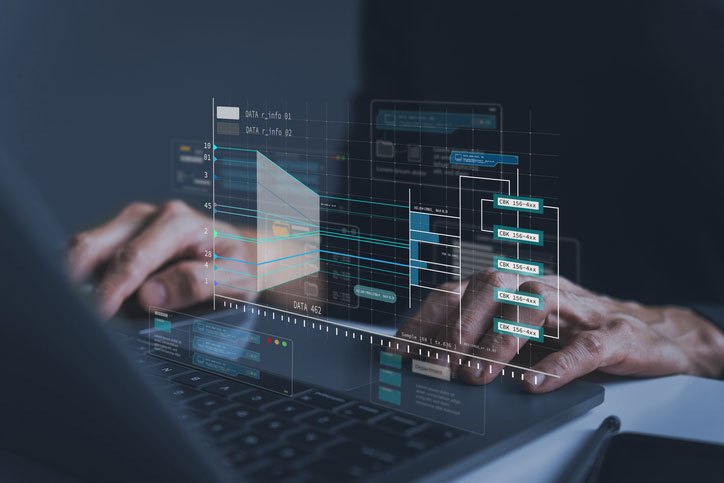Written by Scott Wilson

Just because artificial intelligence and machine learning are coming from the world of information technology, it doesn’t mean that everyone in that field is ready for them.
Software development is a profession with hundreds of specializations. Only a handful of the areas of expertise deal with ML or AI directly. So the emergence of enormously capable generative AI models is as much a surprise to the average dev as to accountants or lawyers.
The impact of AI on technologists is going to be just as big as any other industry, too. Like lawyers or journalists, software developers make their living through language. Although the languages are highly specific and rigorous sets of instructions in computer code, they have syntax, rules, and meaning… just like English.
AI has proven to be just as capable of crafting competent, and even elegant, computer code as it has drafting legal briefs or writing news articles.





It’s no secret that changes come fast in IT and programming. So software development professionals and interface designers are going to have to roll with AI when it lands… and it’s landing now.
Software Development and User Experience Have Built the Modern World
 People who aren’t in the IT industry don’t spend a lot of time thinking about the enormous range of services and support that goes into all the software and devices we take for granted.
People who aren’t in the IT industry don’t spend a lot of time thinking about the enormous range of services and support that goes into all the software and devices we take for granted.
As amazing as computer hardware has become, packing the power of a computer into the form of a mobile phone, it’s all just plastic and metal without code to bring it to life. And the code itself has to have guidance, design, utility—it has to provide a user experience to make it worth using.
User experience (UX) designers come up with those ideas of form and function. With an understanding of psychology and technology, they create the most natural ways of interacting with unnatural devices. In an industry where high technology is king, UX experts find ways to put humans first.
Software developers write the code that powers applications and services that run on computers. You’re only reading this right now because a developer sat down and coded a set of instructions to power a word processor used to write the words; another built the email system that delivered them to an editor; and still others put together the vast array of internet addressing services, transport protocols, web servers, and browsers required to render them on your screen.
That’s a lot of code. In the future, it could all be written by AI.
How Artificial Intelligence Is Transforming Software Development Today and Tomorrow
 Artificial intelligence tools are rolling out to the world of software and user experience design quickly. With an entire workforce of early adopters, who are accustomed to bugs, who enjoy solving puzzles, this is an industry that is an easy target for early AI solutions.
Artificial intelligence tools are rolling out to the world of software and user experience design quickly. With an entire workforce of early adopters, who are accustomed to bugs, who enjoy solving puzzles, this is an industry that is an easy target for early AI solutions.
The impacts on software developers and user experience professionals are slightly different, however.
AI in Software Development
Software developers are some of the first people to really get the benefits of generative AI. Tools like Microsoft’s Copilot or MutableAI act as virtual pair programmers, looking over code as it’s written and making suggestions for optimization. Even ChatGPT can perform credible feats of optimization or turn out basic functions based on plain English requests.
AI is autocomplete for code on steroids.
While the most common uses today is line by line review and suggestions, AI is already in the field that can write an entire function just from a title. Others allow the programmer to enter comments, and the AI will parse out a code snippet to fulfill them. It can also generate entire APIs or frameworks for common requirements.
Artificial intelligence is also a blessing for testing. With flexibility in excess of most testing frameworks, AI can hunt down and identify all kinds of bugs that wouldn’t normally show up until release.
AI in User Experience Design
While it’s the role of UX designers to focus on humans, AI can provide surprising insights to help them in that task. You might not expect that a machine could have better insights on how people work and use technology than a human, but since generative AI is trained on millions or billions of samples of actual human output, it can have a surprisingly human touch.
 With an ability to provide unparalleled mimicry of human conversation and interaction, generative chat systems can be used to test user interfaces and systems long before a human is involved. Since they can be generated in infinite variety and tuned to all different types of attitudes and behaviors, they offer a comprehensive way to simulate UX interactions.
With an ability to provide unparalleled mimicry of human conversation and interaction, generative chat systems can be used to test user interfaces and systems long before a human is involved. Since they can be generated in infinite variety and tuned to all different types of attitudes and behaviors, they offer a comprehensive way to simulate UX interactions.
AI also offers incredible opportunities to customize the user experience right down to the individual level. While UX designers today have to play to the statistics, by putting AI behind the interface, it can adapt directly to each individual user that it encounters.
You can already see the fruits of AI in user experience through improvements in recommendation and rating systems used by Netflix and Amazon.
That path inevitably leads to AI itself becoming the user experience. UX designers may evolve to be more like trainers than designers, optimizing chatbots and other interactive AI for various industries and uses.
Finally, AI design tools can be used to sketch out interfaces more quickly and accurately than human designers. Like AI image generators, UX designers of the future may simply describe the goals and look they imagine, and have an AI effortlessly produce the code and layout… all ready to be plugged in to backend systems.
Exploring AI Jobs Emerging in the Fields of Software Development and UX Design
This will be the realm of the AI developer and programmer. Many of these positions are already popping up, with titles like:
- Python Developer for AI
- Artificial Intelligence Developer
- Software Developer - AI Trainer
- Gen AI Developer
- Product Designer - AI Design
- Principal UX Researcher - AI
For the most part, they aren’t necessarily new jobs. Instead, most programming and user interface engineering jobs are going to involve AI to some extent, starting now. The job titles may not change, but the required skillset definitely will.
Naturally, senior developers and researchers will be involved in building the plugins and integrated development environments that have AI baked into them… but those, too, are software development jobs!
There will also be some new types of jobs that emerge. First and foremost is the artificial intelligence prompt engineer.
While instructing an AI to produce code or other artifacts doesn’t require the precision or rigor of writing C++, it’s not entirely the same as describing what you want in plain English, either. Prompt engineers are the experts who intuit the language most likely to elicit the desired results from a particular large language model.
In a sense, all software developers working with AI will become prompt engineers of a sort.
As noted above, many user experience professionals will become, in effect, AI trainers. As AI itself becomes the interface to most computer programs, UX designers will be needed who can optimize it for the intended uses.
AI system architects will be big in the software world as well. No one is going to throw out codebases with millions of lines of functioning code. AI will have to be integrated with existing systems. Figuring out the right way to do that, and how to make sense of the overall workflow and structure, will be a job for experts in both coding and AI behaviors.
Software Specializations Will Influence Both Education and Certification Choices in AI
 Not all coding work is created equal. Artificial intelligence may smooth out some of the big differences between front-end developers and embedded systems programmers, but coders will still need to understand the demands of individual industries and platforms.
Not all coding work is created equal. Artificial intelligence may smooth out some of the big differences between front-end developers and embedded systems programmers, but coders will still need to understand the demands of individual industries and platforms.
Similarly, there can be a lot of differences in good UX design between, say, a web gaming platform and a spacecraft command console.
UX designers and software developers alike will need to tailor their AI expertise to the industry and systems they are building for.
What Is the Best Education for Positions in UX and Software Programming in AI?
 One of the bright spots in software development and UX design is that AI might enable people to get into those fields with less education than is currently required. While the ability to think logically and design systems is still firmly in the court of human specialists, the in-depth detail of systems architecture, data structures, and code vocabulary won’t be so important. Programmers will dream big; AI will take care of the details.
One of the bright spots in software development and UX design is that AI might enable people to get into those fields with less education than is currently required. While the ability to think logically and design systems is still firmly in the court of human specialists, the in-depth detail of systems architecture, data structures, and code vocabulary won’t be so important. Programmers will dream big; AI will take care of the details.
So a Bachelor of Science in Artificial Intelligence or a Bachelor of Science in Computer Science with a Concentration in AI is likely to be perfect qualification for jobs in the AI programming world. Although there will still be advanced tool developers and leads who need the more in-depth expertise that comes with a Master of Science in Machine Learning, those roles will be the exception.
All the major groundwork laid in a BSAI goes toward the kind of challenges AI programmers will face:
- Advanced math and statistics to understand algorithm and deep neural network function
- Machine learning and artificial neural network training
- Discrete structures in data and code
- Programming paradigms and patterns
- Programming languages and software architecture
- Software engineering and testing
User experience designers have a more varied menu of potential degrees to choose from. The same BSAI offers a step in the right direction. Usually, more electives in design and interface work will be selected than for a pure programming career.
But there are also concentrations in UX design associated with majors like a Bachelor of Science in Computer Graphics Technology, or even a full Bachelor of Science in Design for User Experience. A Bachelor of Science in Human Computer Interaction is another common choice. Similar programs are available at the master’s level. But many UX experts learn the essentials of their trade with backgrounds in:
- Computer Science
- Psychology
- Design/Industrial Design
- Information Systems
What all of these are lacking is a strong component in AI and ML. While choosing the right electives at a school with a strong computer science department can help make up that gap, there’s another path that many UX designers and even software developers are likely to follow.
Earning an Educational Certificate in AI to Brush up on Core Skills
 One big way that current software developers and UI designers will use to adapt to AI tools is through educational certificates. For anyone who has already put in the time and energy to earn a degree in a technical field like computer science, a certificate program is the perfect way to build AI skills on top.
One big way that current software developers and UI designers will use to adapt to AI tools is through educational certificates. For anyone who has already put in the time and energy to earn a degree in a technical field like computer science, a certificate program is the perfect way to build AI skills on top.
With only a few classes, certs aren’t going to deliver a ground-up education in AI. But they can be completed quickly and for relatively little money compared to a degree. And those classes will work with existing knowledge and experience to develop a better appreciation for machine learning, deep neural networks, and statistical reasoning as they apply in AI for programming.
So an Advanced Certificate in Artificial Intelligence in Computer Science or an AI Foundations for Product Innovation Graduate Certificate may be the right ticket to making the jump into AI programming.
Professional Certification Will Be a Big Feature for AI Programmers and UX Designers
 Professional certifications are a big feature in the software development world already. Artificial intelligence won’t change that. Instead, it’s likely to expand the range of certs that developers might want to consider when polishing up their resumes.
Professional certifications are a big feature in the software development world already. Artificial intelligence won’t change that. Instead, it’s likely to expand the range of certs that developers might want to consider when polishing up their resumes.
This is an area where there is a lot of overlap between the conventional specialist certifications and new certs specific to AI and ML. Programmers working in the field will very likely find benefits from picking up one or more on both sides of the aisle.
AI certifications may simply be viewed as a new kind of specialty cert for programmers, just like security or databases.
Certifications in AI work the same as other professional certifications: by demonstrating, through verified education, experience, and examination, their skills in AI or ML tools or topics, third party organizations can attest to those skills and abilities. Employers looking for staff who are up-to-date in these areas have an easy way to sort resumes at that point. Many positions require or recommend one or more of these certifications.
All this is nothing new to folks in the software industry, though. Change is eternal and adaptation is a requirement. By embracing AI, programmers and UX designers will build better systems faster… and spend more of their time on the big picture rather than the gritty details.






